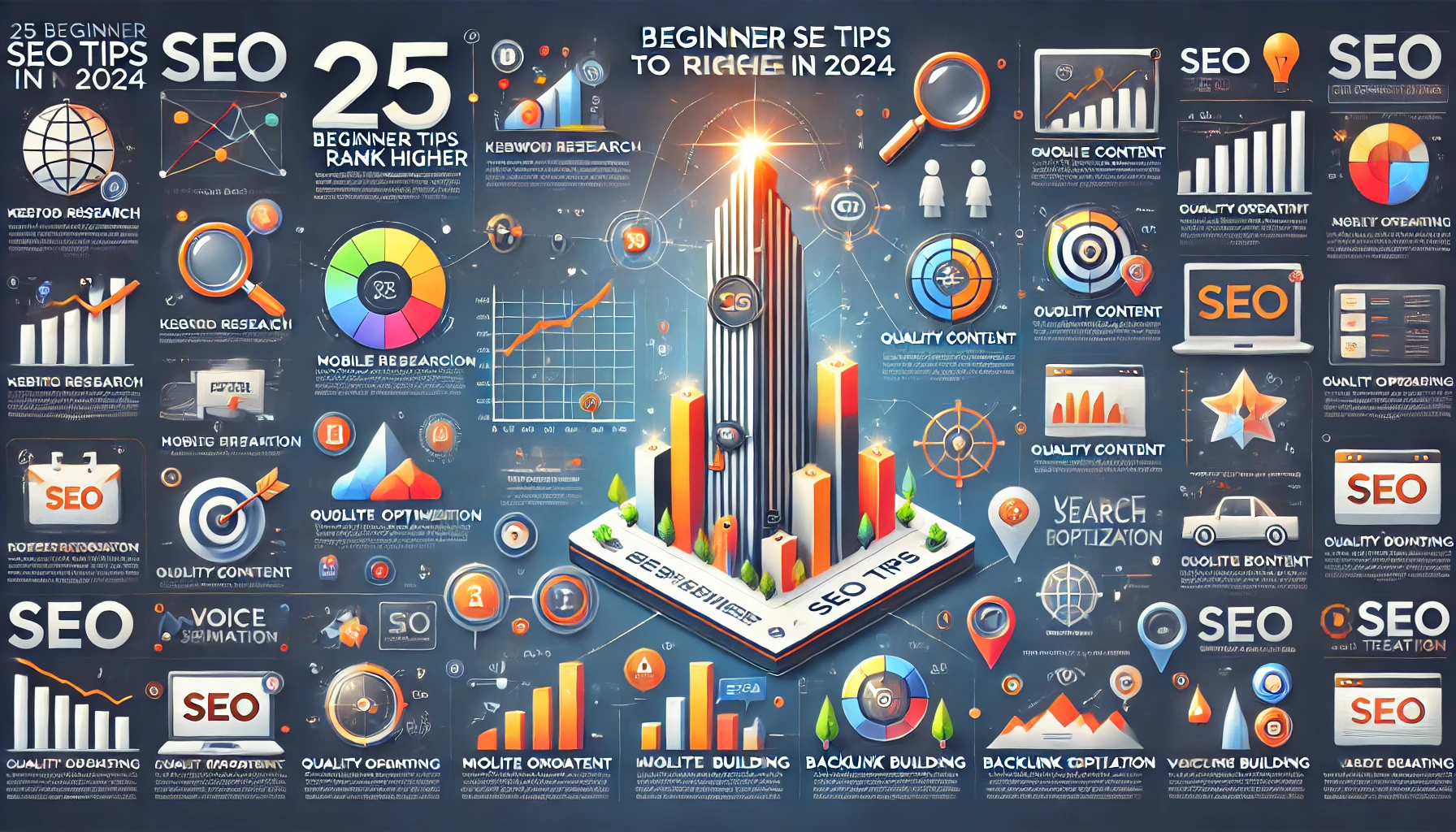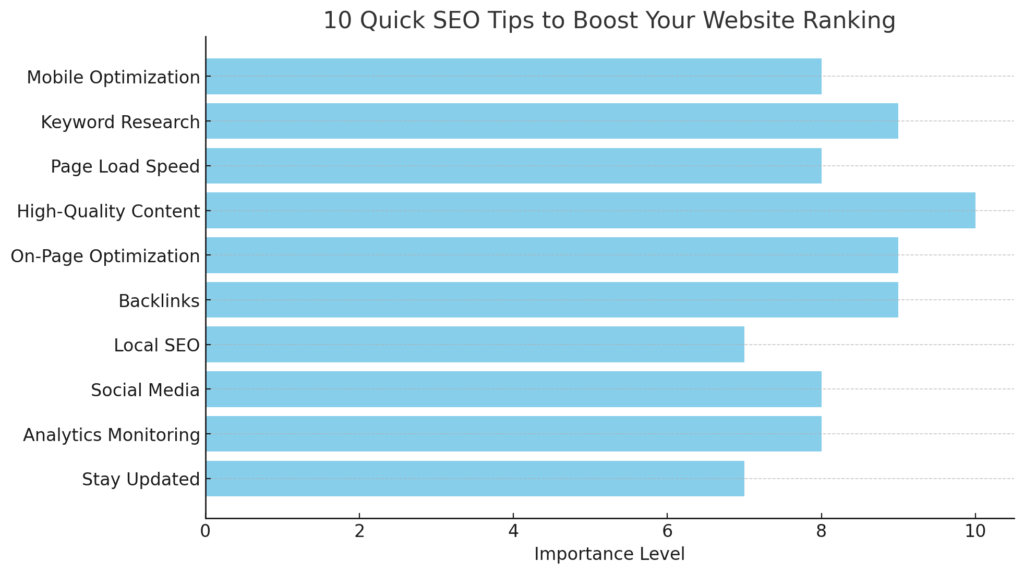SEO Updates
25 Beginner SEO Tips to Rank Higher in 2024

In 2024, SEO (Search Engine Optimization) remains one of the most effective strategies to grow your online presence, drive organic traffic, and improve website rankings. Whether you’re a small business owner, a blogger, or managing a large e-commerce store, understanding and implementing SEO is vital to staying competitive in the digital landscape.
For beginners, diving into SEO might feel overwhelming, but with the right guidance and tools, you can create a strong foundation to build upon. In this comprehensive guide, we’ll cover 25 powerful tips using updated strategies, trends, and data to help you excel in your SEO journey.
Why is SEO Important in 2024?
Search engines are the gateway to the internet, and SEO helps you stand out in the crowded digital marketplace. With Google processing over 8.5 billion searches daily (as of 2024), ranking higher in search results can drive significant traffic and potential customers to your website.
Moreover, with the rise of AI-driven search features and voice search, optimizing your site ensures you stay ahead of technological changes.
25 Powerful SEO Tips for Beginners
1. Master Keyword Research
Keyword research forms the backbone of any SEO strategy. Use updated tools like Ahrefs, SEMrush, and Google Keyword Planner to identify trending keywords with low competition. Focus on long-tail keywords like “how to improve website ranking for beginners” as they often have higher conversion rates.
2. Optimize Your Content for User Intent
Understanding user intent in 2024 is more critical than ever. Users search for specific answers, and your content must deliver value. Address informational, navigational, and transactional queries to ensure your content ranks for diverse search intents.
3. Leverage SEO-Friendly Content Writing Techniques
When creating content, prioritize readability, structure, and engagement. Use short paragraphs, bullet points, and subheadings. Include primary keywords like “SEO tips for beginners” naturally, without overstuffing.
4. Focus on Mobile Optimization
In 2024, over 58% of global web traffic comes from mobile devices. Google’s mobile-first indexing means your site must be mobile-friendly. Tools like Google Mobile-Friendly Test can help you evaluate and optimize your site for smartphones and tablets.
5. Improve Website Speed
Website speed directly affects user experience and rankings. Pages that load in less than 2 seconds have higher engagement rates. Use tools like GTmetrix or Google PageSpeed Insights to identify bottlenecks and implement fixes, such as optimizing images or enabling browser caching.
6. Build High-Quality Backlinks
Backlinks remain a significant ranking factor in 2024. Focus on quality rather than quantity. Reach out to authoritative websites for guest blogging opportunities and participate in forums to build backlinks for SEO that drive credibility.
7. Conduct Regular SEO Audits
Run an SEO audit guide every quarter to analyze your site’s performance. Tools like Screaming Frog can help identify issues such as broken links, duplicate content, or missing meta tags.
8. Prioritize Local SEO Strategies
If you operate a local business, optimizing for local SEO for beginners is essential. Create or update your Google My Business profile, include location-specific keywords, and encourage customer reviews.
9. Optimize for Voice Search
With the increasing use of smart assistants like Alexa and Siri, voice search queries are becoming more conversational. Use phrases and long-tail keywords like “best pizza places near me” to cater to this growing trend.
10. Avoid Common SEO Mistakes
Common mistakes such as keyword stuffing, ignoring analytics, and poor mobile optimization can hurt your rankings. Keep track of what works and avoid practices flagged as outdated or manipulative.
Advanced SEO Techniques for 2024
11. Use Structured Data
Structured data (schema markup) helps search engines understand your content better. It can enhance your results with rich snippets like star ratings, images, and FAQs.
12. Create Video Content
Video is dominating in 2024, with platforms like YouTube and TikTok driving significant traffic. Optimize your videos with relevant tags, descriptions, and transcriptions.
13. Focus on User Experience (UX)
Google’s Core Web Vitals now play a significant role in rankings. Ensure fast load times, responsive design, and intuitive navigation to provide an exceptional user experience.
14. Develop a Robust Internal Linking Strategy
Internal links connect your pages and keep visitors engaged. A strong linking structure also helps search engines crawl your site effectively.
15. Utilize AI-Powered SEO Tools
AI tools like ChatGPT and Jasper are revolutionizing content creation and optimization. Use them to generate ideas, improve readability, and enhance keyword usage.
SEO Tools for Beginners
16. Keyword Research Tools
Start with tools like Ubersuggest or Moz to find relevant keywords for your niche.
17. SEO Plugins
If you’re using WordPress, install plugins like Yoast SEO or Rank Math to simplify technical optimization.
18. Analytics Tools
Google Analytics and Search Console provide detailed insights into your traffic and ranking performance.
19. Rank Tracking Tools
Monitor your keyword positions with tools like SE Ranking or SERPWatcher to measure progress.
20. Backlink Analysis Tools
Use platforms like Majestic or Ahrefs to analyze and strengthen your backlink profile.
Emerging Trends in SEO for 2024
21. AI-Driven Personalization
Search engines now emphasize personalized results. Tailor your content to align with user behavior for higher engagement.
22. Optimize for Zero-Click Searches
Focus on featured snippets, FAQs, and other content formats that answer user queries directly on the SERPs.
23. Multilingual SEO
If you target a global audience, implement multilingual SEO strategies to cater to different languages and regions.
24. Content Refresh
Regularly update old content with current information and trends to maintain relevance and rankings.
25. Invest in Localized Content
Localized strategies for small businesses include publishing location-specific blogs and using geo-targeted ads.
Conclusion: Your SEO Journey Starts Here
SEO in 2024 is dynamic, driven by technological advancements and evolving user behavior. By following these 25 powerful tips, you’ll be equipped with the tools and knowledge to grow your website traffic, enhance user experience, and achieve higher rankings.
Remember, SEO is a long-term commitment. With consistent effort and adaptation to new trends, your website can become a significant player in its niche.
Blog
7 Proven Techniques of the Best Digital Marketing Company in Bhopal

Today, there is no question that digital marketing is not a choice but rather a must. Whether you run a small local shop or a big national company, your online presence is crucial.
The top digital marketing agencies in Bhopal apply a combination of tactics including seo, social media marketing, web development and paid advertising in order to greatly grow your business.
In this post, we highlight 7 key strategies top digital agencies implement to drive traffic, gain leads and sales for local businesses in Bhopal.

Importance of Digital Marketing for in Bhopal Businesses
Bhopal is an evolving market and it’s completely dependent on internet surfing to let people make purchases. Whether it’s restaurant meals or real estate, customers go online for information before making purchases.
A good marketing agency in Bhopal can assist your business:
SEO and Social Media Optimization for more online visibility
Generate leads with targeted PPC ads Create qualified leads through PPC ads that are targeted to promote your firm for the services important to business owners.
Establish trust and authority through epic content
Personalize campaigns for a local market, so that your marketing is more relevant
Example:
A local restaurant making smart choices online can rank in “near me” searches, drive foot traffic and ramp up its online orders thanks to Google and Instagram ads.
Develop an Effective Digital Marketing Strategy
Every winning campaign begins with a detailed, actionable plan.
Your strategy should include:
Market research and competitor analysis
Knowing your audience and their needs
Selecting appropriate marketing channels (SEO, social media, PPC, etc.
Establishing Goals and KPIs to define success
Pro Tip:
Begin with organic marketing including SEO and social media. When you get the ball rolling, invest in some PPC advertising for quicker results.
Smart SEO with Latest Updates
SEO is the lifeblood of digital expansion. One of the best SEO companies in Bhopal has been working on following three factors.
On-page SEO: It relates to all factors on your own website which can be optimised for search engines like google, including content, meta tags and internal hyperlink building.
Off-page SEO: Generating quality backlinks and citations for local business
Technical SEO: Increasing speed, mobile responsiveness and site structure.
The ability of your site to evolve and avoid getting penalised is determined by its keep-it-fresh score, not the arbitrary date you published it.
Example Keyword Use:
“Our team stays up to date with the most recent SEO changes to help our clients rank and maintain their rankings over time.”
High-Performing Website Design & Development
Your website is essentially your digital shop front. Slow or poorly designed, potential customers will go elsewhere.
What A web design company in Bhopal does?
Mobile-friendly, responsive designs
Pages load in less than 3 seconds
SEO-friendly structure and clean coding
Clean and tidy navigation with strong CTA buttons
A web development company in Bhopal, on the other hand, makes sure your website is secure and scalable along with incorporated analytics to track well.
Internal Linking Tip:
Link this to your web development service page for stronger SEO.
Social Media Marketing That Engages
Social media isn’t just about posting images-it’s also a place to connect with your audience.
An effective social media marketing strategy consists of:
Interactive material such as reels, videos and infographics
Consistent posting schedules
Utilize local hashtags and trending topics.
Creating paid advertisements for targeted exposure
Example:
A Bhopal-based apparel brand saw sales take a 45% jump after posting Instagram ads and tied up with local influencers.
Focused PPC Campaigns for Immediate Effects
PPC advertising is all about getting immediate exposure and instant results when done right.
The top agencies use to advertise by PPC:
Google Ads for search-driven traffic
Facebook & Instagram Ads for local targeting
LinkedIn Ads for B2B businesses
Benefits of PPC:
Instant traffic and visibility
Better audience targeting
Easy tracking and measurable ROI
Internal Linking Tip:
For more details, link to your PPC service page.
Tactic 6 – Always Blog And Create Content Old but new, this takes people away.
Your content is what helps you build that trust and get established as an authority in your niche.
Top agencies focus on:
Blogs that highlight response to customer questions on a weekly basis
Local seo content for bhopal audiences. 2019 hsn code list city wise searchable pdf and excel file.
Educational resources to nurture leads
Example Blog Topics:
24 SEO Updates Every Business Owner Should Know
Why to Join Web Development Classes in Bhopal? Opportunities on Your Career”
Top Small Business Digital Marketing Trends
Follow Data to Analyze and Improve
Digital marketing is not a one-time job. You must monitor your progress and optimize incessantly.
You can do this through tools such as Google Analytics and Search Console:
Monitor traffic and conversions
Identify underperforming pages
Modify tactics according to the facts
Pro Tip:
Weekly review of analytics with small, steady changes.
FAQs
Q1. What would you need a digital marketing company in Bhopal?
Local agencies simply know the market, competition, how customers behave better and that gives you a definite edge.
Q2. How frequently should I be updating my SEO strategy?
No less than 4 times per year or after significant Google algorithm changes.
Q3. What is more effective: SEO or PPC?
SEO is for sustainable growth, PPC is providing instant results. A mix of both is ideal.
Q4. What are the best in digital marketing topics to study?
SEO, social, PPC, content and analytics.
Conclusion & Call to Action
Developing an effective internet presence is hard – it takes a lot of time, consistency and knowhow. With these seven strategies, your business can differentiate itself and grow at a faster pace than that of the competition.
Final Tip:
Collaborate with a reliable digital marketing agency in Bhopal to receive professional advice and measurable results.
Ready to grow your business?
Reach out to Orphic Solution now for a free SEO analysis and consultation.
Blog
Google’s New Algorithm Updates 2024: Impacts on Local SEO and Content Quality

In 2024, Google has rolled out several significant algorithm updates that are reshaping the landscape of local SEO and content quality. These changes are crucial for businesses to understand in order to stay competitive and maintain high search engine rankings. Let’s explore the impacts of these updates and the best strategies to adapt.
Understanding Google Algorithm Updates 2024

The Google algorithm updates 2024 have introduced several changes aimed at improving the quality and relevance of search results. These updates emphasize high-quality content, proximity-based SEO, and strict spam policies.
The Google Vicinity Update
One of the major changes in 2024 is the Google Vicinity update, which focuses on proximity-based SEO. This update prioritizes businesses that are geographically closer to the searcher, enhancing the relevance of local search results. For local businesses, this means optimizing their online presence to appear prominently in local searches.
Impacts on Local SEO Strategies
The Google Vicinity update significantly impacts local SEO strategies. Businesses need to focus on local search optimization to ensure they are visible to nearby customers. Here are some strategies to consider:
- Optimize Google My Business (GMB) Profiles: Ensure your GMB profile is complete with accurate business information, hours, and high-quality images.
- Local Keywords: Use location-specific keywords in your website content, meta descriptions, and titles to enhance local search visibility.
- Customer Reviews: Encourage satisfied customers to leave positive reviews on Google, as reviews are a critical factor in local rankings.
Enhancing Content Quality SEO
With the 2024 updates, Google places a stronger emphasis on high-quality content SEO. Content must be informative, well-written, and relevant to the user’s search intent. Here are some SEO best practices 2024 for content:
- In-depth Content: Create comprehensive content that thoroughly covers the topic. Avoid thin content that lacks substance.
- Originality: Ensure all content is original and not duplicated from other sources. Google rewards unique insights and perspectives.
- User Experience: Focus on user experience by making your website easy to navigate, mobile-friendly, and fast-loading.
Adapting to Google Core Update Effects
The Google core update effects are evident in how search rankings fluctuate based on content quality and relevance. To adapt, businesses should follow these SEO content guidelines:
- Regular Updates: Keep your content updated to reflect the latest information and trends.
- Engaging Media: Use images, videos, and infographics to make content more engaging and valuable to users.
- Author Expertise: Highlight the expertise and credentials of content authors to establish authority and trust.
Addressing Spam Policy Updates
Google’s updates in 2024 include stringent spam policy updates Google. These policies aim to reduce spammy and low-quality content. Here’s how to ensure your site complies:
- Avoid Keyword Stuffing: Use keywords naturally and avoid overstuffing them into your content.
- Link Quality: Focus on building high-quality backlinks from reputable sources rather than engaging in link schemes.
- Content Authenticity: Ensure all content is genuine and offers real value to users, avoiding tactics that might be perceived as manipulative.
Proactive Measures for Search Ranking Improvements
To achieve search ranking improvements, it’s essential to stay ahead of the curve with continuous optimization. Here are some proactive measures:
- Audit Regularly: Conduct regular SEO audits to identify and fix issues that may affect your rankings.
- Engage Users: Foster engagement through interactive content, social media integration, and responsive customer service.
- Monitor Competitors: Keep an eye on competitors’ strategies and adapt your own tactics to stay competitive.
Conclusion
The Google search algorithm changes in 2024 highlight the importance of high-quality content and local relevance. By focusing on content quality SEO, leveraging proximity-based SEO strategies, and adhering to updated SEO best practices 2024, businesses can navigate these changes effectively. Staying informed and proactive is key to maintaining strong search engine performance and achieving long-term success.
Implement these strategies and continuously adapt to the evolving SEO landscape to ensure your business remains visible and competitive in the ever-changing digital world.
Blog
10 Quick SEO Tips to Boost Your Website Ranking

Improving your website’s ranking is crucial for gaining visibility and attracting organic traffic. Here are 10 quick SEO tips to help you enhance your site’s performance using effective SEO strategies and best practices.
1. Optimize for Mobile Devices

With the rise of mobile internet usage, ensuring your website is mobile-friendly is critical. Google prioritizes mobile-friendly sites in its rankings, so make sure your site is responsive and loads quickly on all devices.
2. Conduct Thorough Keyword Research
Effective SEO starts with finding the right keywords. Use tools like Google Keyword Planner or Ahrefs to discover relevant SEO keywords and incorporate them naturally throughout your content. This is essential for SEO for beginners and experts alike.
3. Improve Page Load Speed
A slow-loading website can hurt your rankings and user experience. Optimize images, leverage browser caching, and use a content delivery network (CDN) to speed up your site. Fast loading times are a key component of SEO best practices.
4. Create High-Quality Content
Content is king in SEO marketing. Focus on creating informative, engaging, and original content that provides value to your audience. This will not only attract visitors but also encourage other sites to link to yours, boosting your SEO.
5. Optimize On-Page Elements
Ensure your title tags, meta descriptions, headers, and URLs include your target SEO keywords. Proper on-page optimization helps search engines understand the relevance of your content, which is vital for SEO strategies.
6. Build Quality Backlinks
Backlinks from reputable websites are a strong ranking factor. Aim to earn backlinks through guest blogging, partnerships, and creating shareable content. Quality over quantity is the rule here, aligning with SEO best practices.
7. Utilize Local SEO Techniques
If you run a local business, local SEO is essential. Claim your Google My Business listing, encourage customer reviews, and use location-specific keywords to improve your visibility in local searches.
8. Use Social Media to Your Advantage
Social media can amplify your SEO efforts by driving traffic to your site and increasing your content’s reach. Share your content on social platforms and engage with your audience to enhance your SEO marketing strategy.
9. Monitor Your Analytics
Regularly check your website’s performance using tools like Google Analytics. Understanding your traffic sources, user behavior, and conversion rates can help you adjust your SEO strategies for better results.
10. Keep Up with SEO Trends
SEO is constantly evolving, so stay updated with the latest trends and algorithm changes. Follow reputable SEO blogs, attend webinars, and continuously refine your SEO tactics to stay ahead in the game.
By following these tips and integrating them into your overall SEO strategy, you can improve your website’s ranking and drive more organic traffic. Remember, SEO is an ongoing process, and staying committed to these best practices will yield long-term benefits.
FAQs
What are the basic SEO strategies I should follow?
Basic SEO strategies include keyword research, optimizing on-page elements, creating high-quality content, improving page load speed, building quality backlinks, and ensuring your website is mobile-friendly.
How do I start with SEO for beginners?
Start with keyword research to identify relevant SEO keywords. Optimize your website’s title tags, meta descriptions, headers, and content with these keywords. Focus on creating valuable content and improving your site’s usability and speed.
What are some SEO best practices?
SEO best practices include using relevant keywords, optimizing your site for mobile devices, improving page load speed, creating high-quality content, earning backlinks from reputable sites, and regularly monitoring your analytics.
How can I optimize my website for local SEO?
To optimize for local SEO, claim and optimize your Google My Business listing, use location-specific keywords, encourage customer reviews, and ensure your name, address, and phone number (NAP) are consistent across all platforms.
Why is keyword research important in SEO marketing?
Keyword research helps you understand what terms your target audience is searching for. By incorporating these SEO keywords into your content, you increase the chances of your website ranking higher in search results, driving more organic traffic.
How can I improve my page load speed?
Improve page load speed by optimizing images, leveraging browser caching, using a content delivery network (CDN), and minimizing unnecessary scripts. A fast-loading site enhances user experience and positively impacts your SEO ranking.
What role do backlinks play in SEO strategies?
Backlinks from reputable websites signal to search engines that your content is valuable and trustworthy. Quality backlinks can significantly improve your website’s authority and ranking in search results.
How can social media help with SEO?
Social media helps increase your content’s reach and drives traffic to your website. Engaging with your audience on social platforms can also lead to more shares and backlinks, indirectly benefiting your SEO efforts.
What tools can I use for SEO keyword search?
Tools like Google Keyword Planner, Ahrefs, SEMrush, and Moz can help you conduct thorough SEO keyword searches. These tools provide insights into search volume, competition, and related keywords to enhance your SEO strategy.
How do I keep up with the latest SEO trends?
Stay updated with SEO trends by following reputable SEO blogs, attending industry webinars, and subscribing to newsletters from SEO experts. Regularly updating your knowledge ensures your SEO strategies remain effective and competitive.






